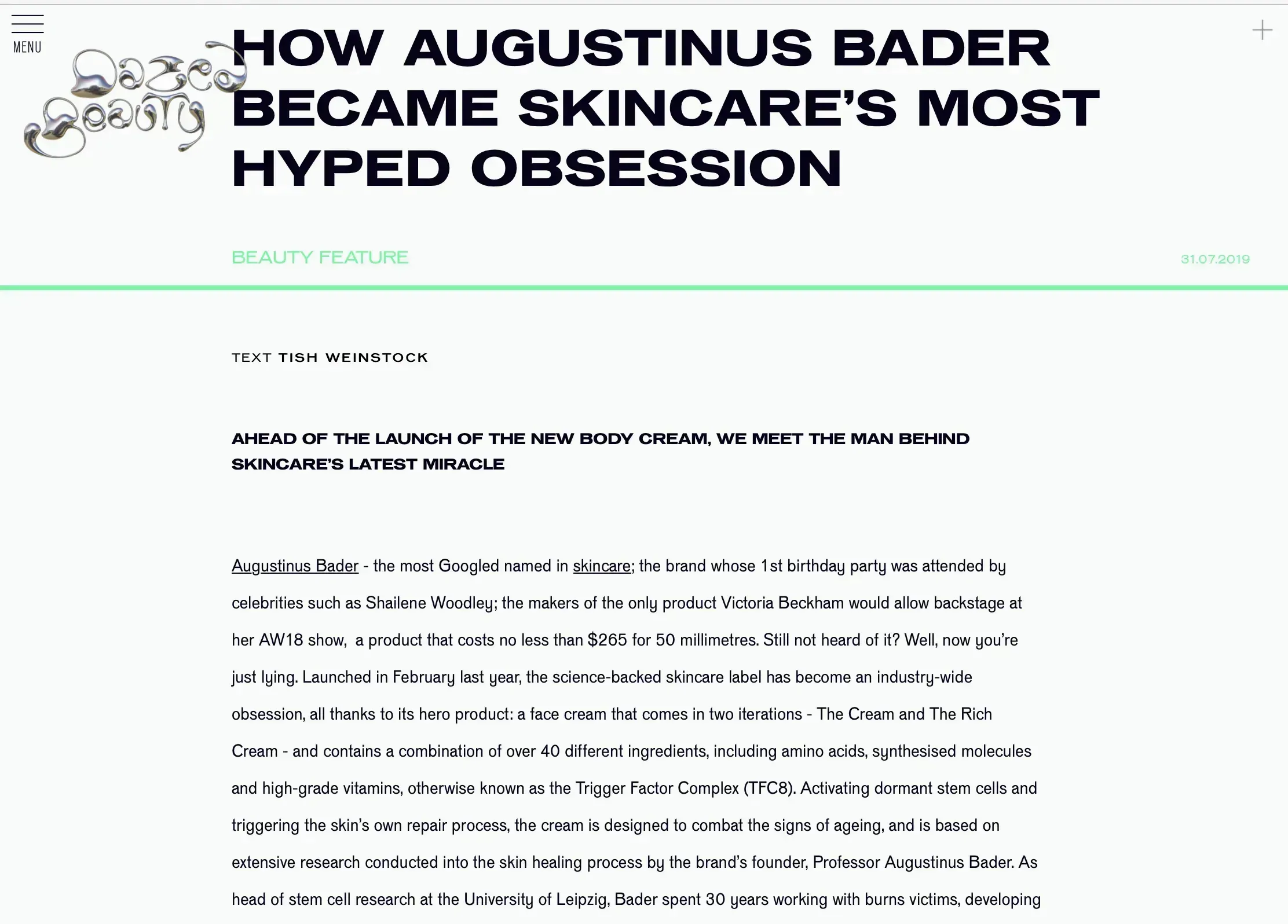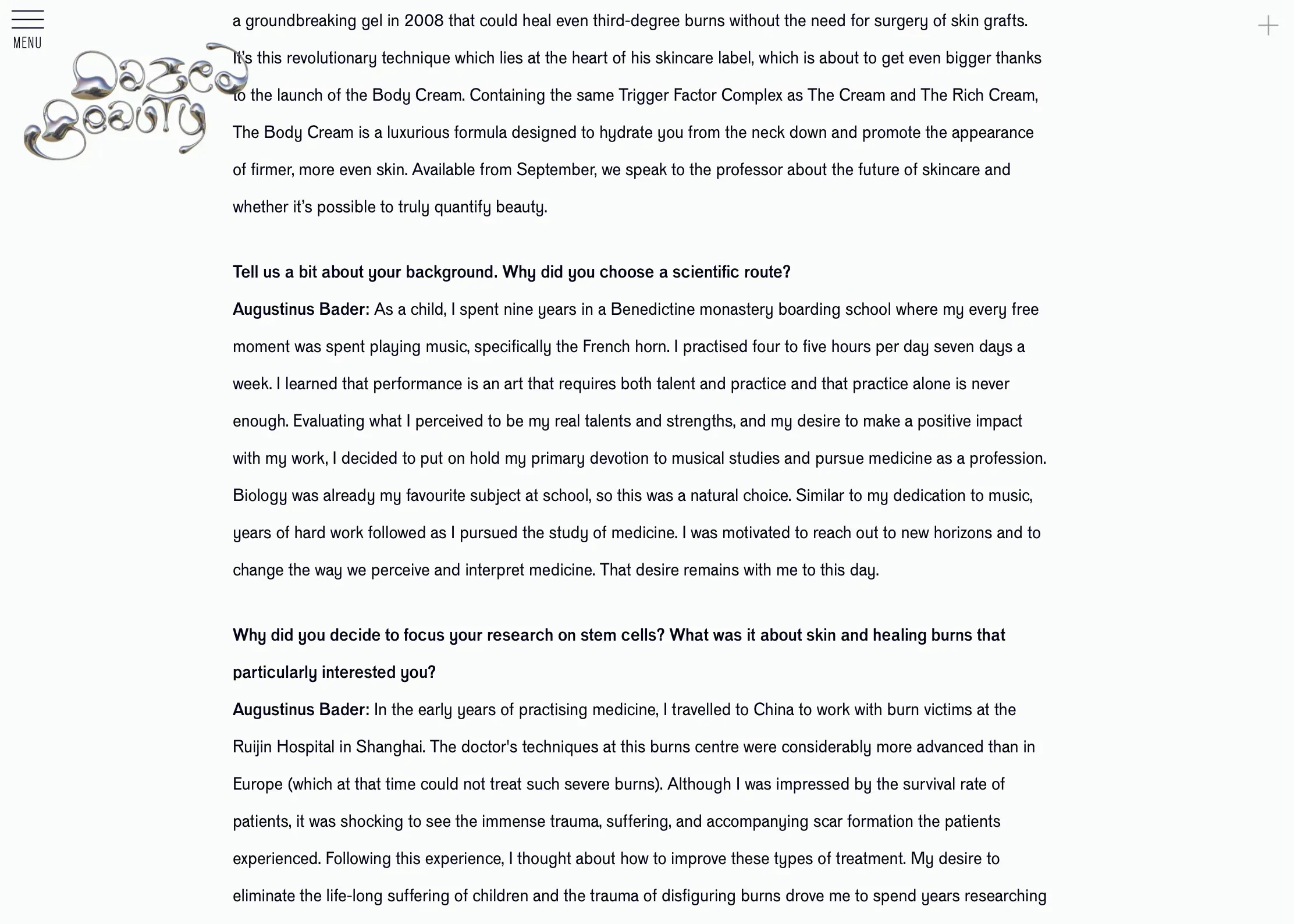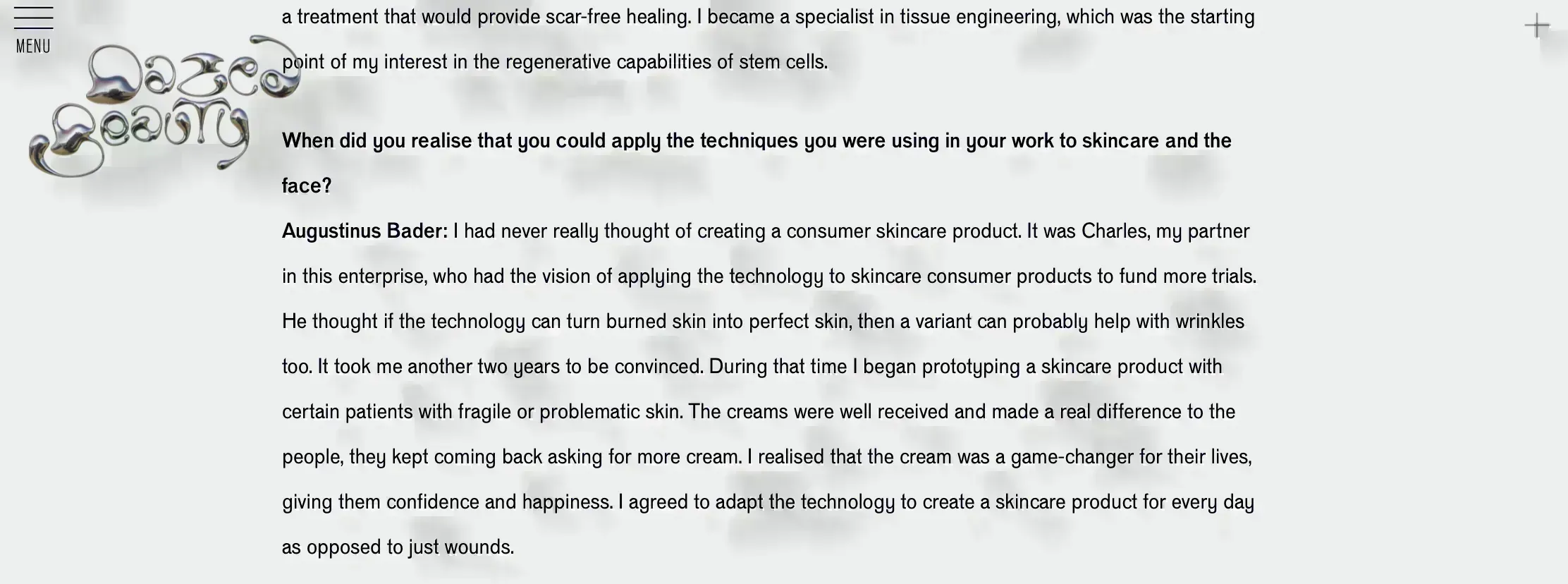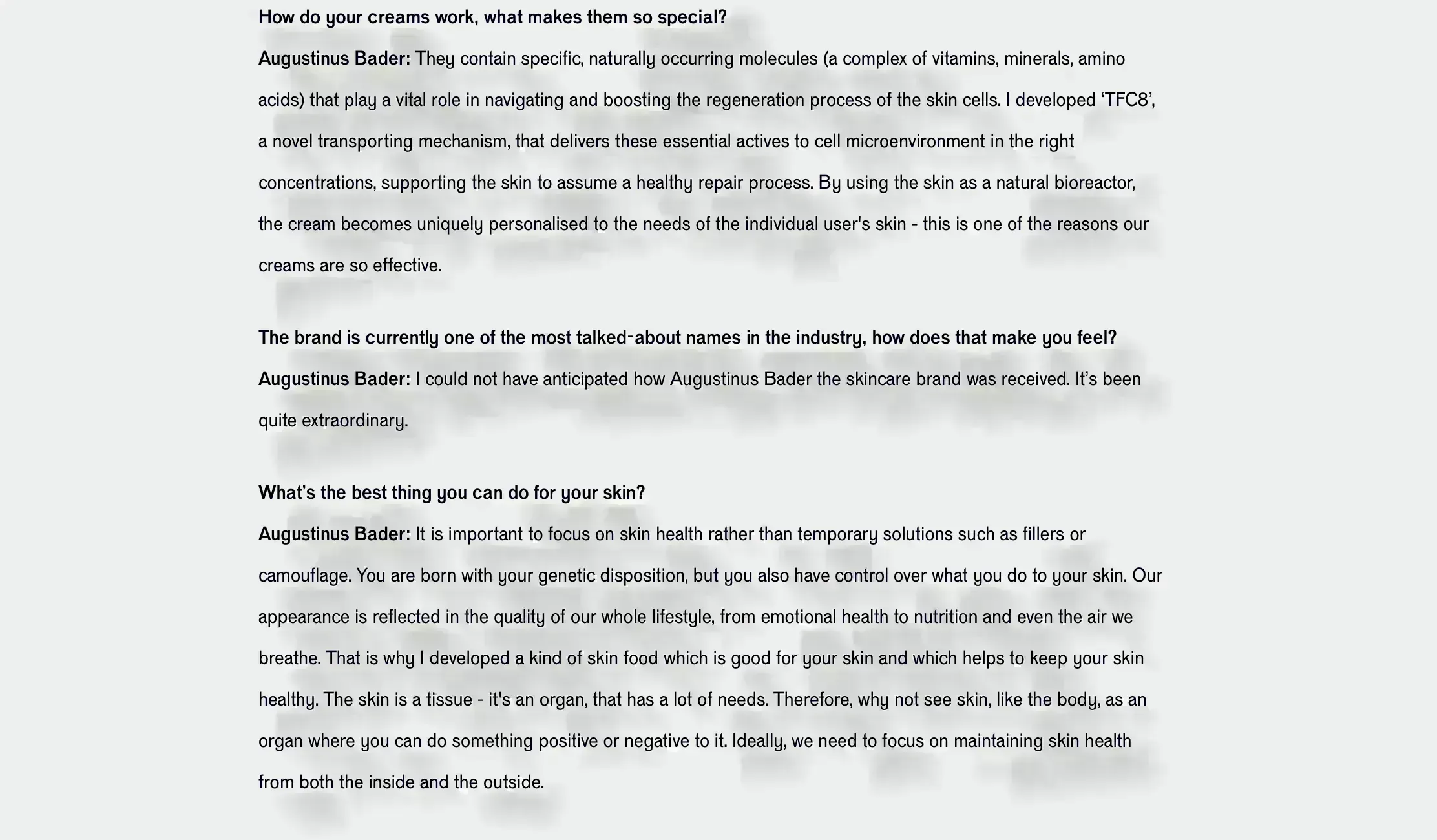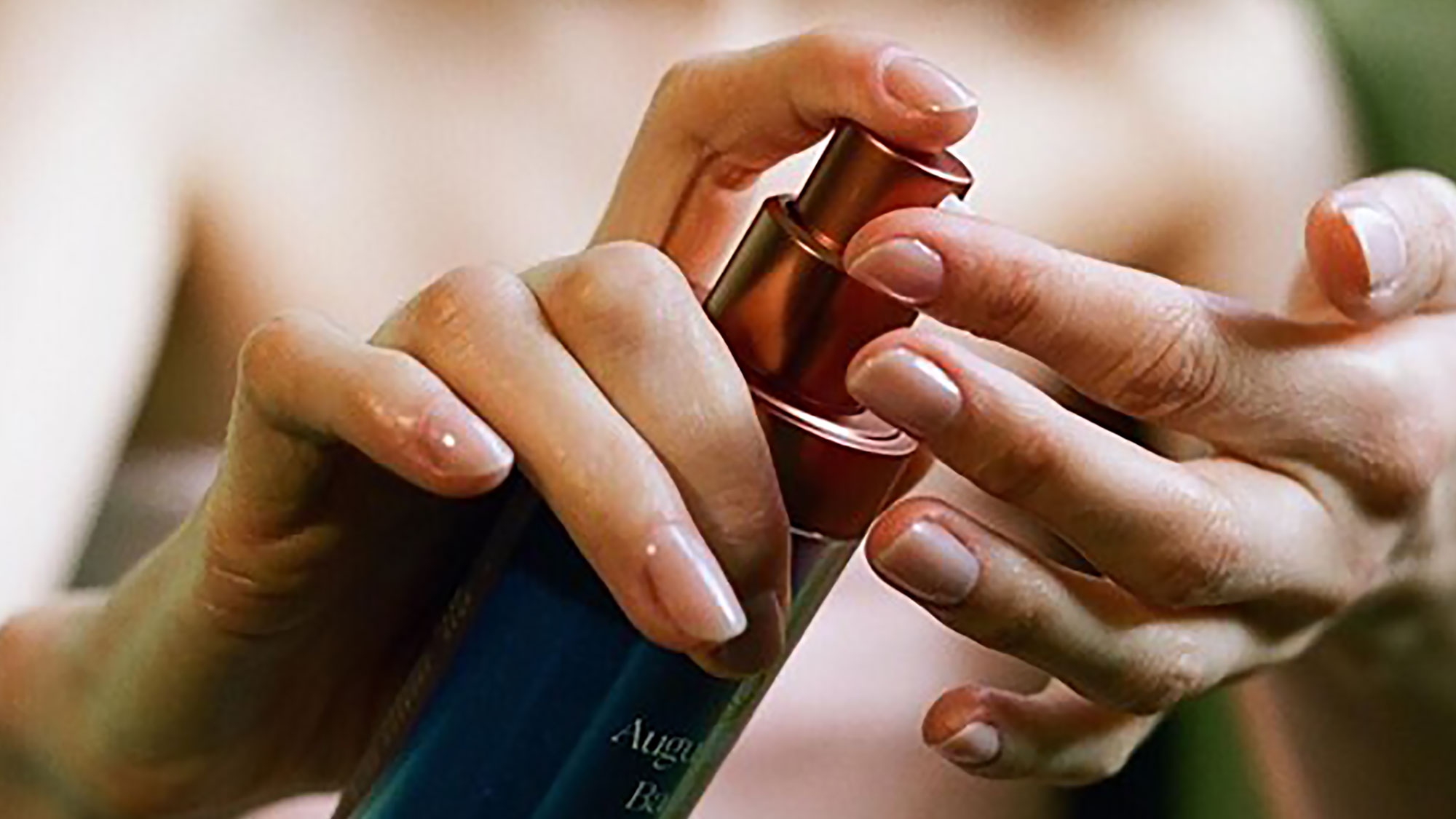Augustinus Bader - the most Googled named in skincare; the brand whose 1st birthday party was attended by celebrities such as Shailene Woodley; the makers of the only product Victoria Beckham would allow backstage at her AW18 show, a product that costs no less than $265 for 50 millimetres. Still not heard of it? Well, now you’re just lying. Launched in February last year, the science-backed skincare label has become an industry-wide obsession, all thanks to its hero product: a face cream that comes in two iterations - The Cream and The Rich Cream - and contains a combination of over 40 different ingredients, including amino acids, synthesised molecules and high-grade vitamins, otherwise known as the Trigger Factor Complex (TFC8). Activating dormant stem cells and triggering the skin’s own repair process, the cream is designed to combat the signs of ageing, and is based on extensive research conducted into the skin healing process by the brand’s founder, Professor Augustinus Bader. As head of stem cell research at the University of Leipzig, Bader spent 30 years working with burns victims, developing a groundbreaking gel in 2008 that could heal even third-degree burns without the need for surgery of skin grafts. It’s this revolutionary technique which lies at the heart of his skincare label, which is about to get even bigger thanks to the launch of the Body Cream. Containing the same Trigger Factor Complex as The Cream and The Rich Cream, The Body Cream is a luxurious formula designed to hydrate you from the neck down and promote the appearance of firmer, more even skin. Available from September, we speak to the professor about the future of skincare and whether it’s possible to truly quantify beauty.
Tell us a bit about your background. Why did you choose a scientific route?
Augustinus Bader: As a child, I spent nine years in a Benedictine monastery boarding school where my every free moment was spent playing music, specifically the French horn. I practised four to five hours per day seven days a week. I learned that performance is an art that requires both talent and practice and that practice alone is never enough. Evaluating what I perceived to be my real talents and strengths, and my desire to make a positive impact with my work, I decided to put on hold my primary devotion to musical studies and pursue medicine as a profession. Biology was already my favourite subject at school, so this was a natural choice. Similar to my dedication to music, years of hard work followed as I pursued the study of medicine. I was motivated to reach out to new horizons and to change the way we perceive and interpret medicine. That desire remains with me to this day.
Why did you decide to focus your research on stem cells? What was it about skin and healing burns that particularly interested you?
Augustinus Bader: In the early years of practising medicine, I travelled to China to work with burn victims at the Ruijin Hospital in Shanghai. The doctor's techniques at this burns centre were considerably more advanced than in Europe (which at that time could not treat such severe burns). Although I was impressed by the survival rate of patients, it was shocking to see the immense trauma, suffering, and accompanying scar formation the patients experienced. Following this experience, I thought about how to improve these types of treatment. My desire to eliminate the life-long suffering of children and the trauma of disfiguring burns drove me to spend years researching a treatment that would provide scar-free healing. I became a specialist in tissue engineering, which was the starting point of my interest in the regenerative capabilities of stem cells.
When did you realise that you could apply the techniques you were using in your work to skincare and the face?
Augustinus Bader: I had never really thought of creating a consumer skincare product. It was Charles, my partner in this enterprise, who had the vision of applying the technology to skincare consumer products to fund more trials. He thought if the technology can turn burned skin into perfect skin, then a variant can probably help with wrinkles too. It took me another two years to be convinced. During that time I began prototyping a skincare product with certain patients with fragile or problematic skin. The creams were well received and made a real difference to the people, they kept coming back asking for more cream. I realised that the cream was a game-changer for their lives, giving them confidence and happiness. I agreed to adapt the technology to create a skincare product for every day as opposed to just wounds.
How do your creams work, what makes them so special?
Augustinus Bader:They contain specific, naturally occurring molecules (a complex of vitamins, minerals, amino acids) that play a vital role in navigating and boosting the regeneration process of the skin cells. I developed ‘TFC8’, a novel transporting mechanism, that delivers these essential actives to cell microenvironment in the right concentrations, supporting the skin to assume a healthy repair process. By using the skin as a natural bioreactor, the cream becomes uniquely personalised to the needs of the individual user's skin - this is one of the reasons our creams are so effective.
The brand is currently one of the most talked-about names in the industry, how does that make you feel?
Augustinus Bader: I could not have anticipated how Augustinus Bader the skincare brand was received. It’s been quite extraordinary.
What’s the best thing you can do for your skin?
Augustinus Bader: It is important to focus on skin health rather than temporary solutions such as fillers or camouflage. You are born with your genetic disposition, but you also have control over what you do to your skin. Our appearance is reflected in the quality of our whole lifestyle, from emotional health to nutrition and even the air we breathe. That is why I developed a kind of skin food which is good for your skin and which helps to keep your skin healthy. The skin is a tissue - it's an organ, that has a lot of needs. Therefore, why not see skin, like the body, as an organ where you can do something positive or negative to it. Ideally, we need to focus on maintaining skin health from both the inside and the outside.
Are there any common misconceptions people have which are actually damaging the skin?
Augustinus Bader: Skincare brands have been making claims about the impact of the external application of foreign stem cells (i.e., cells derived from plants and animals) since 2007. Stem cells are destined to create the type of cells corresponding to the tissue and the species they are taken from. An orange stem cell could only make an orange, a stem cell from another human being is best for the human it came from. Virological risks of taking cells from other humans or even animals do exist, or risks derived from cell culture do exist. So your own stem cells in your own body are certainly worth looking into as a valid and physiologic alternative as those cells are endowed with the natural means to repair you or just your skin to be your best.
How do you think your field will evolve in the future? Are there any upcoming technologies or techniques that you are excited about and think will have a large impact?
Augustinus Bader: Many parts of the world still work on manipulating stem cells with different means. We have learned a lot from these conventional approaches and I concluded that we need to fix stem cell microenvironments rather than adding more stem cells. Using the natural regenerative process of endogenous stem cells for a cell, tissue and organ regeneration is emerging as an exciting therapeutic avenue for both current medical practice as well as preventive medicine and well-being with potential safe, long-lasting and substantial improvements in the quality of life. I believe preventive medicine will change how we see conventional medicine in the future.
Taken from Dazed Beauty.
